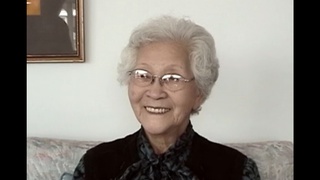Interviews
Leaving to Argentina (Spanish)
(Spanish) I left from the port of Kobe, with forty-six days of travel on the Pacific Ocean, Indian Ocean, and Atlantic Ocean. It was more or less forty-six days. But my leaving Japan was not so emotional, because I received orders to board and I went to the port of Kobe. There was a workers’ strike…and the ship did not leave. The ship was unable to depart until the strike was settled. We had to wait. Everyday I went to the port at 8:00 A.M. I was staying at the home of my uncle and aunt, and I told them: “Uncle and Aunt, you accompanied me. Forget it. I leave everyday at 8:00 in the morning. If the ship doesn’t leave, I will return…and if it doesn’t leave again, I will return the following morning, and if I don’t return you can assume that I left with the ship.” This going back and forth lasted for about ten days…everyday I returned to my uncle’s house at 12:00…and he had become accustomed to me coming back. [He would say,] “Ah, again! “You will return!” Until one day I didn’t return. In reality, at that time, to leave by ship made for a sad departure. Many people cried, the ship had a banner, and with the port and Hotaru music (not Hikari music), of saying goodbye (bon voyage)…that was dramatic enough. But nobody came to see me off. [Then my life became] “At what time do you leave?” “At 8:00 P.M.” “I am going to sleep a little and at 8:00 I woke up, at least I want to say goodbye to Japan.” I awakened, looked at my watch, it was 8:00. I went to the window, it was still clear. “How strange! The day was so long,” and I called the porter. “Did we leave?” He answered, “The ship left at 8:00 but yesterday.” When I awoke we were in the middle of the Pacific Ocean…thus, it was for the best, I didn’t feel sentimental or anything like that.
Date: February 23, 2007
Location: Buenos Aires, Argentina
Interviewer: Takeshi Nishimura, Ricardo Hokama
Contributed by: Centro Nikkei Argentino









